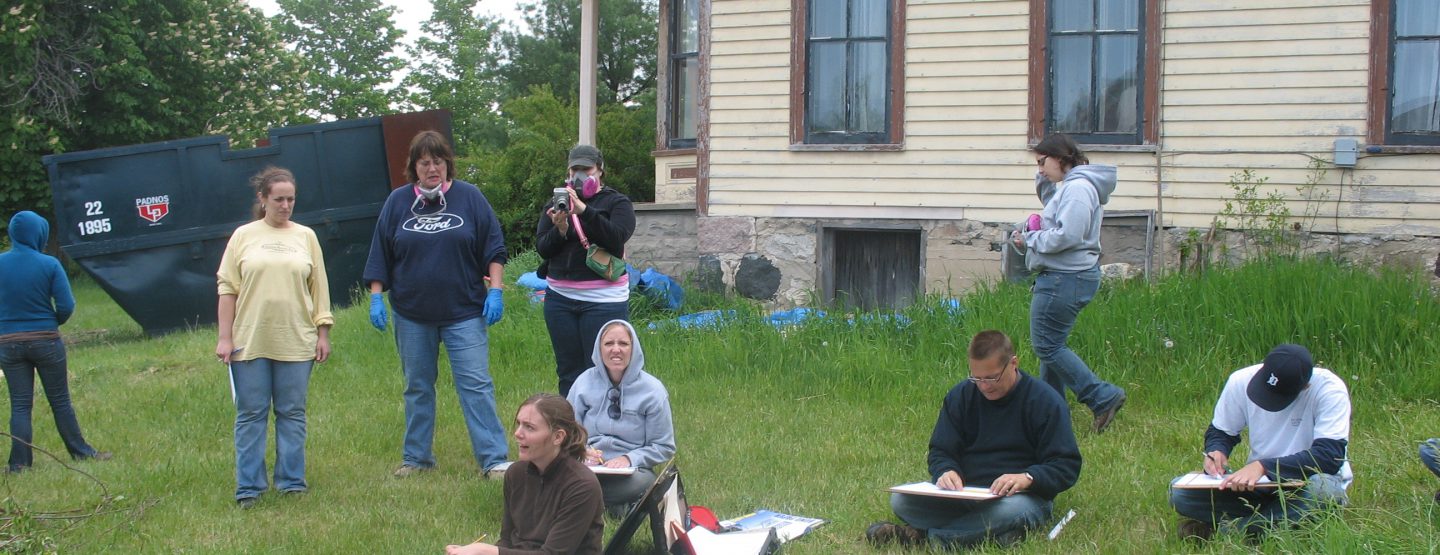From our 2009 Summer Newsletter
When Louis DeYoung locked the door behind him and moved into a nearby assisted living facility in 1998, he left a home full of history. A decade later, during a sunny week in June, two-dozen graduate students from Eastern Michigan University’s historic preservation program and their professors carefully removed and documented artifacts and treasures from the mustard-colored farmhouse on Cherry Bend Road. Among the finds: made-in-the-U.S.A. toys from the early 20th century, a homemade cherry-motif dress that had been worn in the National Cherry Queen Pageant, pocket watches, a 1936 Sears & Roebuck Jubilee Catalog, boxes full of hand-penned letters and much more. The treasures were packed up and given to local museums for safekeeping and eventual display.
“Years down the road, people are going to be so happy that the Conservancy not only protected the land here at the DeYoung Natural Area, they saved this whole historic site, which is just amazing,” says Dr. Ted Ligibel, longtime director of EMU’s Historic Preservation Program. “This is one of the most important sites in the region, and, in my opinion, is as good as it gets. The whole farmstead is intact and the things that are here speak volumes about the early history of both Traverse City and Leelanau County.”
The Leelanau Conservancy’s permanent protection of the 145-acre DeYoung farmstead began in May 2006 when we purchased the land and began a three-year quest to raise the needed $2 million to secure the property. The roof on the house was caving in, the porch was rotting and water damage and mold threatened the home’s future. While funds were limited, we put on a new roof on the house and water wheel building, rebuilt the porch and took other measures to stabilize the farmstead buildings and barns. “Our first order of business was to pay for the land,” says Stewardship Director, Jenee Rowe, who worked with the EMU team and oversees the caretaking of our natural areas. “Beyond stabilizing the buildings, we couldn’t even think about restoring these historic buildings. Really, their future depends on finding funds and partners to restore them for adaptive reuse.”
Rotary Charities of Traverse City funded the Historic American Engineering Record (HAER) Assessment conducted on-site by EMU. The HAER is an important step that helps to lay the groundwork for preservation and eventual use of the farmstead building. The Conservancy will first seek grants and private donations to restore the water wheel building, which captured the attention of the experts on site in June because of its unique history. It is here that Louis DeYoung installed a water wheel along a diverted stream and used the power it generated to do everything from blacksmithing to powering some of the first residential light bulbs in the area. “This building tells a great story and is a wonderful example of farmer ingenuity,” says Dr. Ligibel. “Here you have a farmer who brought nature and agriculture together in a sustainable fashion, which is so topical for the direction we’re trying to go in today.”
In addition to working on the house and its contents, students also crafted new windows for the waterwheel building under the guidance of Jeff Weatherford. A graduate of the program, he now owns a company in Tecumseh, Michigan that specializes in architectural repair and replication. The hope is that funds can eventually be found to continue the field school and restore the water-wheel building over time, engaging students in hands-on learning. Ligibel and other experts who were on site predict that the building could become a tourist draw because of its history and rarity in the state. Plans call for EMU to return again next June to carry on with the project if funding can be secured.
“We’ve been acquainted with Dr. Ligibel and his program for years,” says Brian Price, Executive Director. “And we’ve always been aware of the fact that history and culture, and how earlier generations adapted to the land, is important and fascinating to many of our members. The DeYoung farm project gives us a chance to collaborate with true experts in the field of historic preservation.
The 20-year-old program at EMU has won numerous awards including the American Association of State & Local History’s coveted “Certificate of Commendation” for 10 years of nationally recognized performance within the field of historic preservation education.
Meanwhile, items that the museums did not want, such as vintage linens and a wicker desk, will be featured in our auction at our picnic on August 6.




